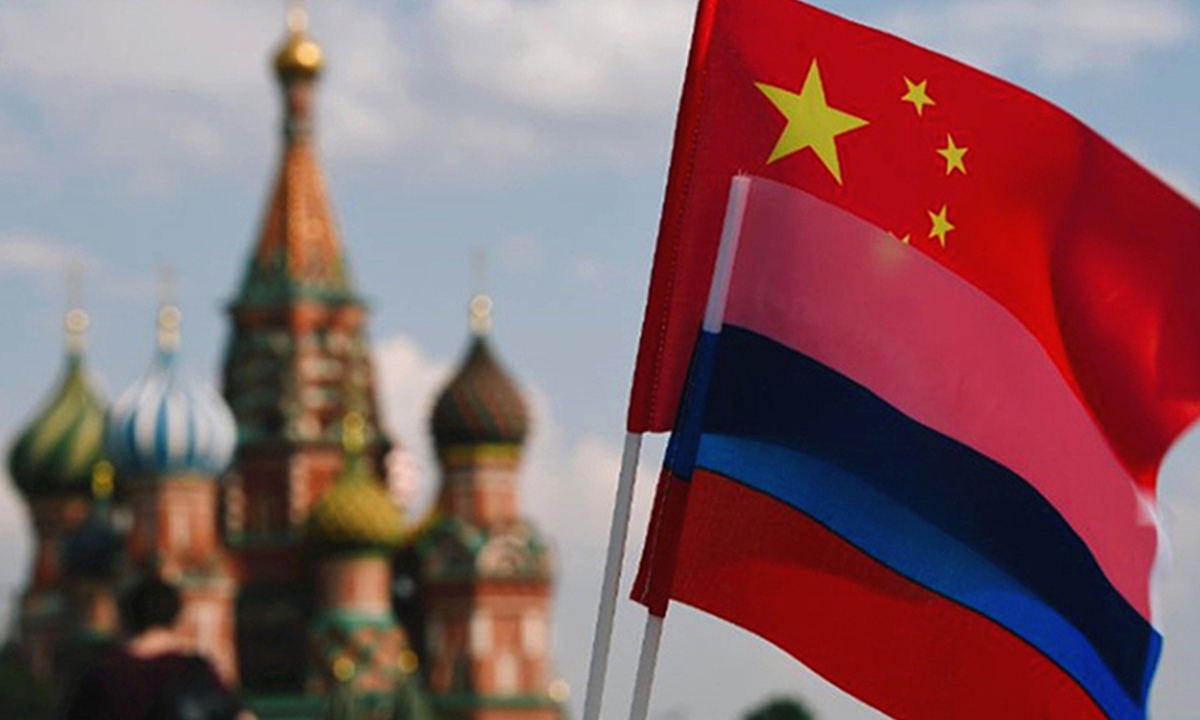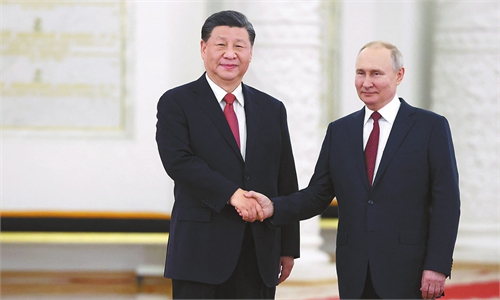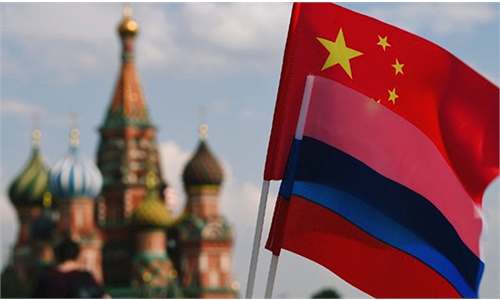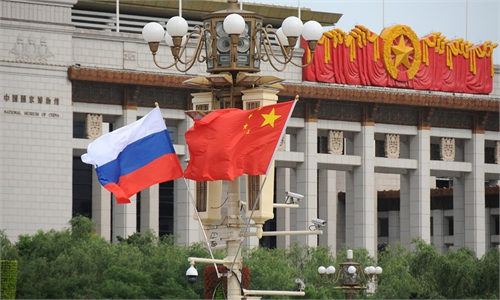Devt model imported from West is inefficient and Moscow should change direction: Russian scholar

The national flags of China and Russia are seen on Red Square, Moscow. Photo: Xinhua
Editor's Note:
On Wednesday, Chinese President Xi Jinping concluded his three-day state visit to Russia. After the talks between the two heads of state Tuesday, the two sides agree to deepen the comprehensive strategic partnership of coordination for a new era. What is the significance of the Xi-Putin meeting? How has the idea of "a community with a shared future for mankind" contributed to today's world? Yury Tavrovsky (Tavrovsky), deputy chairman of the Russian-Chinese Friendship Society and head of the expert council at the Russian-Chinese Committee for Friendship, Peace and Development, discussed these issues with Global Times (GT) reporter Bai Yunyi.
GT: How do you evaluate the meeting between Xi and Putin and the China-Russia relations in the current stage?
Tavrovsky: The meeting is a significant event not only for the recent political agenda but also for many years, which has shown the world that China-Russia relations have entered a new and advanced stage.
The documents signed between Chinese and Russian leaders are very important and our strategic cooperation goes one step further. There will be further developments because the situation in the [global] security field is deteriorating very quickly. And we must take some precautions as economic cooperation is developing quickly.
The 4.5-hour informal meeting on Monday was historic because the world is in a new situation of a global cold war, and there are actually two fronts of this cold war - the Western front and the Eastern front. The Western front is aimed at Russia, which stretches from Finland to Romania, where we have open hostilities - actually, a war going on in Ukraine.
While in the East, the Eastern front is under construction. It is not yet completed. America started to make this second front in 2018 after former US President Donald Trump opened his economic sanctions against China, then the Hong Kong riot, the Taiwan Straits tensions and now the AUKUS bloc has been created, with more and more arms being sent to Taiwan island. They're actually preparing something very nasty.
So there are those two friends - Russia and China - who can and must coordinate their efforts to prevent the global catastrophe because the people in the White House are very irresponsible. It is very important for Xi and Putin to analyze this situation and discuss possible cooperation without constructing a new military bloc.
GT: During Monday's meeting, the Chinese and Russian sides had an in-depth exchange of views on the Ukraine issue. According to Putin, Russia has carefully studied China's position paper on the political settlement of the Ukraine issue and is open to talks for peace. What is your take on China's position paper?
Tavrovsky: On the Ukraine crisis, China-proposed peace initiative is very important. It shows a new dimension of China after proclaiming this global security doctrine.
After the conflict started in Ukraine last year, there were talks. There were talks between Russians and the Ukrainians, and some documents were even already prepared for signing. And then Americans told them to stop, and it was stopped. If Russia and China together can influence Washington, then Washington will tell Kiev to make some concessions to have a compromise.
I don't think that this Chinese initiative will be actually used in the foreseeable future only after some decisive successes are achieved on the frontline.
In response to some reports and claims about China supplying Russia with weapons on the Ukraine battlefields, frankly speaking, Russia doesn't need any Chinese arms or the Chinese people's volunteers appearing on the battlefields.
GT: On March 23, 2013, Chinese President Xi Jinping proposed the idea of "a community of common destiny" for the very first time during his speech at the Moscow State Institute of International Relations. What has changed in the past decade in terms of China's development and its relationship with Russia?
Tavrovsky: We are impressed with this concept and with this strategy. We understand that there is a long way to go to realize these great concepts.
But in the present world of great turbulence with an unpredictable future, the world needs some great ideas to follow because we don't have any other ideas for mankind, from any other country, neither from Russia nor America. America lives in presidential election terms. Russia doesn't have any aim for all those years after the collapse of the Soviet Union.
And we should know. The world should know that the Chinese have the answer. It is very important.
And 10 years ago, there were hopes among Russian elites and the Russian population that we could have good relations with the West, and Russian elites were Western-oriented. And we didn't have those hostilities. We didn't impose economic sanctions against West.
Maybe we'll have better relations with China, but China was not as important as it is now both politically, economically and emotionally. The emotions now are against the West and pro-Chinese. Because after 30 years of our cold war, the Soviet-Chinese cold war, there were many people who didn't feel good toward China. Now, especially in the last year, I think that 90 percent of Russians have very warm feelings toward China, not only because of this political support, but also because we see more Chinese goods.
[Over 10 years ago,] Xi offered some dreams, for example, the Chinese Dream. At first, nobody believed that it can become a reality. And then, 10 years later, we see that this dream has become a reality.
At Monday evening's informal meeting, not so many people noticed when Putin said that China has made a tremendous leap forward in its development. It arouses genuine interest all over the world, and even we envy you a little. It is very important for us Russians, because we understand that the present model of development, which was imported from the West, and its liberal capital is actually inefficient. And we should change the direction of our development and where it will go.



